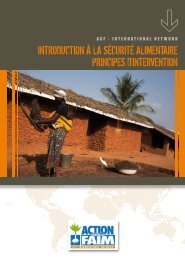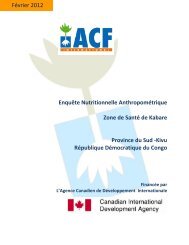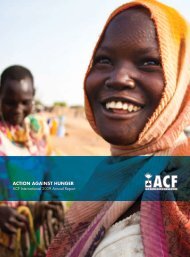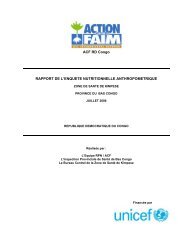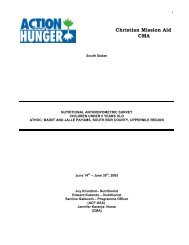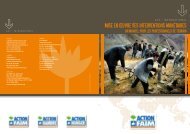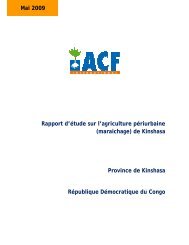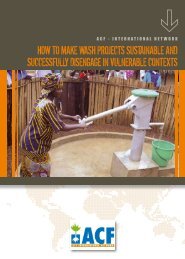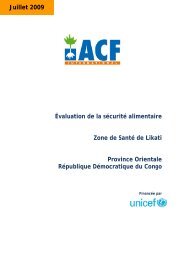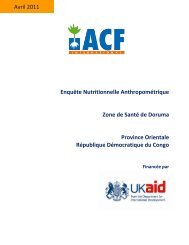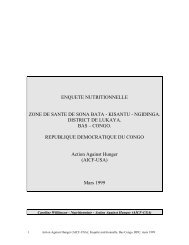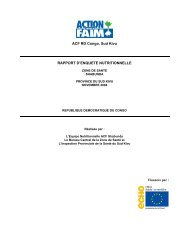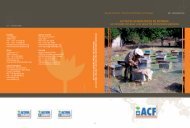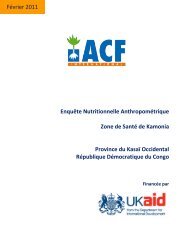Participatory Evaluation of our 2008 - Action Against Hunger
Participatory Evaluation of our 2008 - Action Against Hunger
Participatory Evaluation of our 2008 - Action Against Hunger
Create successful ePaper yourself
Turn your PDF publications into a flip-book with our unique Google optimized e-Paper software.
purchasing <strong>of</strong> their harvest. Another possibility would be to increase the cash component paid<br />
to groups so that they can be empowered to organise their own purchase <strong>of</strong> programme<br />
inputs. This approach would align with that already underway in an ACF direct cash transfer<br />
programme in Lira, wherein groups and individuals are backstopped in managing their own<br />
enterprise planning, savings, and expenditure.<br />
23. ACF should formally request FAO to fulfil its pending <strong>2008</strong> commitments to provide a<br />
plough to each group and a goat to every participant. These were important shortcomings<br />
<strong>of</strong> the <strong>2008</strong> programme that diminished ACF’s legitimacy in participants’ eyes as an effective<br />
implementing agency and weakened potential programmatic impact on household production,<br />
food s<strong>our</strong>ces, income s<strong>our</strong>ces, and resilience.<br />
24. Donors supporting household food security and livelihoods through production should<br />
ensure that cash and kind inputs are available early enough in the calendar year to<br />
ensure NGO programming can capitalise on first season. In practice, due to funding, most<br />
activities did not start until late February and March. Although this still enabled ACF to work<br />
with participants from early in their production cycle, an earlier start to activities would allow<br />
more effective FFS engagement by beginning before land preparation commences. This<br />
approach would increase the benefits <strong>of</strong> working through an entire production cycle. In-kind<br />
contributions to support production have seasonal constraints that determine periods for<br />
delivery, training, preparation, etc.<br />
25. Future FAO data collection <strong>of</strong> NGO farmer field school programmes for both monitoring<br />
and evaluation should be shared routinely with each agency to support their own<br />
internal monitoring. Most <strong>of</strong> the time and energy invested by ACF in FFS monitoring was for<br />
the crop data required by FAO. Data were collected and entered by ACF staff then forwarded<br />
to FAO in Kampala without internal summary or analysis. Nor were there any summary or<br />
analysis fed back from FAO. ACF (and presumably other agencies) would benefit from better<br />
access and use <strong>of</strong> this same information as a complement to its internal M&E. The process<br />
within FAO <strong>of</strong> institutionalising this approach would strengthen their own M&E capacity in the<br />
process, and give further value to the financial and technical support they <strong>of</strong>fer.<br />
<strong>Action</strong> <strong>Against</strong> <strong>Hunger</strong> Uganda - 11 - Farmer Field School <strong>Evaluation</strong>



